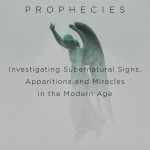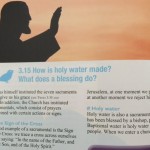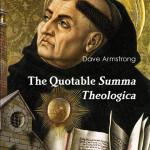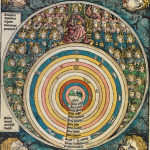Dr. Sanity is pleading, say it ain’t so, Jo and hoping that J.K. Rowling was being evasive when she suggested that Harry Potter may die in Book 7.
Writes Sanity:
Of course there is always a price that the hero must pay to vanquish evil. But if the price is his own death, then what kind of hope or chance is there for the rest of us who are trying to stand up to the darkness? The only way such a sacrifice can be meaningful–in fiction anyway–is if the hero’s death is moral; and the flame of his life inspires the heroic in others.
Well, yeah, I can see her point. But then again Hamlet died while trying to expose a great evil. We hated to see him die but we understood why he must. I mean, imagine if Hamlet had lived. He’d just avenged his father’s murder, seen his mother poisoned, watched Ophelia be buried, taken care of the betrayers, Rosencrantz and Guildenstern –I’d say his job was done. Had he lived, he either would have been haunted or bored. His soul would never, I think, be easy.
And Harry…I can see him surviving the series — everyone wants to see Harry, Hermione and Ron live happily ever after — but what would the rest of Harry’s life be like? Perhaps he’d teach Defense Against the Dark Arts, but Voldemort vanquished it would all seem pretty pedestrian to him wouldn’t it? And rather purposeless? His parents would still be dead. Dumbledore, dead. Possibly Hagrid, dead. One or several Weasleys dead. Ron and Hermione probably wed.
Here is the interesting question: when a life has been lived with a sense of deep mission — as in either Hamlet’s or Harry’s case — and that mission has been fulfilled, what is the purpose of the life, thereafter? If the 18 year old Harry (or a 20-something year old Hamlet) have accomplished their goal, the thing that has driven them and given their whole life meaning and purpose, are we supposed to believe they can ever rest easy in a sort of “busywork” retirement?
Perhaps this is why monarchs, old generals, entrepreneurs, mother-hung rock stars and CBS newsmen can never willingly retire and live out their days. Without their sense of mission, life has no thrust and parry, no vivacity, no purpose.
Dr. Sanity winds it up well and passionately:
Call me a romantic, but in fiction I desperately need for Good to triumph over Evil. I know it doesn’t always happen in the real world–but that is precisely why I need it in a fictional one — a place where virtue, well-being, nobility, happiness, and meaning are all within the realm of human possibility, and where life is not just unmitigated tragedy, violence, and meaninglessness. Without art’s emotional fuel to sustain the vision of the Good, how would we ever be able to carry on?
I could see Harry dying, in the end, for the profound good of ridding the world of Voldemort. It is the Hamlet narrative, absent Hamlet’s tortured and confused sense of morality. It is the Christ narrative, but without the resurrection which answers Dr. Sanity’s need for good to fully and eternally triumph over evil.
Yes, virtue, nobility, happiness and meaning are all within the realm of human possibility, and life is not simply unmitigated tragedy, violence and meaninglessness, but throughout history we have seen that for all of those things to be true, the world requires the rare individual or two who move and shake things and thrust the narratives forward, while the rest of us simply live out our lives.
I wrote about this a while back when I was musing about praise junkies and undercutting greatness:
It is simply true that most people live their lives unknown to all but their immediate family and friends, and they die and in a generation or two, they are completely forgotten – except, perhaps, by people like me, who like to go to cemeteries and take rubbings from headstones. This has always been true, since the dawn of time, and there is absolutely no reason to downplay the dignity and effectiveness that comes with being an average human being.
There was only one Moses, but it was the whole anonymous gang of average Jews who eventually populated the Promised Land. There was only one Martin Luther King but the whole anonymous gang of average marchers who made the trips to Mobile and to Washington DC. There was only one Churchill, but hundreds of thousands of average allied soldiers who put his policies into effect and beat down a great evil. There is only one Dubya, but 150,000 troops liberating Iraq and trying to make a risky-but-visionary effort succeed.
All those “average” men and women, who sojourned or marched or fought had a degree of greatness and nobility to them, and it could be found in their principles or their determination or their steadfastness – but they still, in each case, needed someone with a distinctive edge, with just a tad more “greatness” to bring them together. And there is absolutely no reason not to recognise it.
There have only been 43 American Presidents in 230 years. There have only been 267 popes in 2000 years. There have been billions of other people. Greatness is not an illusion. And it is not fomented with easy praise.
Ophelia and Laertes and Horatio were fine enough people, even perhaps a little noble, but they were not single-minded and undistracted; they could not perceive what was happening around them. Hamlet, in his imperfect greatness, was the only character, besides evil Claudius, with a vision – no matter how distraught – and the gumption to strike out and move the narrative. Hermione and Ron and Hagrid, again, good people, noble, but still rather ordinary. Without Harry, they’re just part of the necessary-but-plain crowd. Harry has the greatness, he moves the narrative, therefore more will be expected of him.
Christ moved the narrative of the world, too. The narrative movers rarely get to live out an ordinary sort of life once things have shifted – more often than not, they die. Resurrection is uncommon.
And so, for the sake of the rest, for that thrust forward, for the propulsion of narrative, so that the rest of the people who inhabit the wonderful world of wizards and magic and Quidditch matches and Hogwarts, Harry Potter may well have to die. Let us gird our loins and be prepared for it!
Hmmmm…now I may have to go back and spend the rest of the summer re-reading books 1-6. I have a hankering to revisit that spectacular and fun place, again.
Prof. Bainbridge says Harry’s toast.
Soccer Dad thinks it through very interestingly.
Suzi disagrees with me, vehemently! :-)
Afterthought…okay now, admit it, it’s fun here, isn’t it? If you read all the posts I’ve written today, you’ll have heard President Bush rap a U2 song. You’ll have seen Bryn Terfel in a loincloth, you’ll have read about Hamlet and Harry Potter, a remarkable Ukulele player, the ad campaign of a good Catholic book, the perfidy of the NY Times, a sleazy campaign tactic, a strain of relentless conservatism, the Restoration of the Marshes of Iraq, Zarqawi’s satirical mother and other Islamic things, Catholic “Internet Idiots,”, and the solemn vows of a Benedictine Nun. Go back a day and you read a post loaded with double entendres about Rush and Viagra, and another that discussing the hoo-ha of Global Warming. And I’m still trying to find the energy to write the thing I really want to write, on the value of virginity…but I’m thinking about it.















